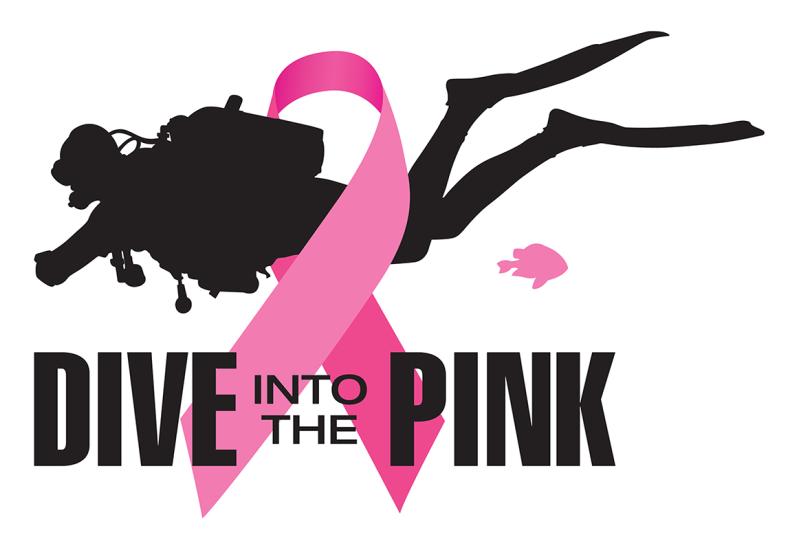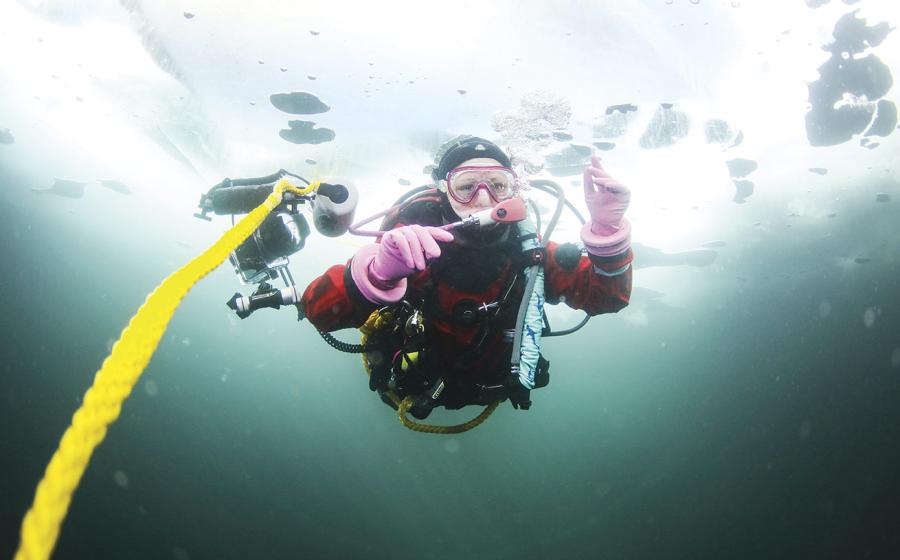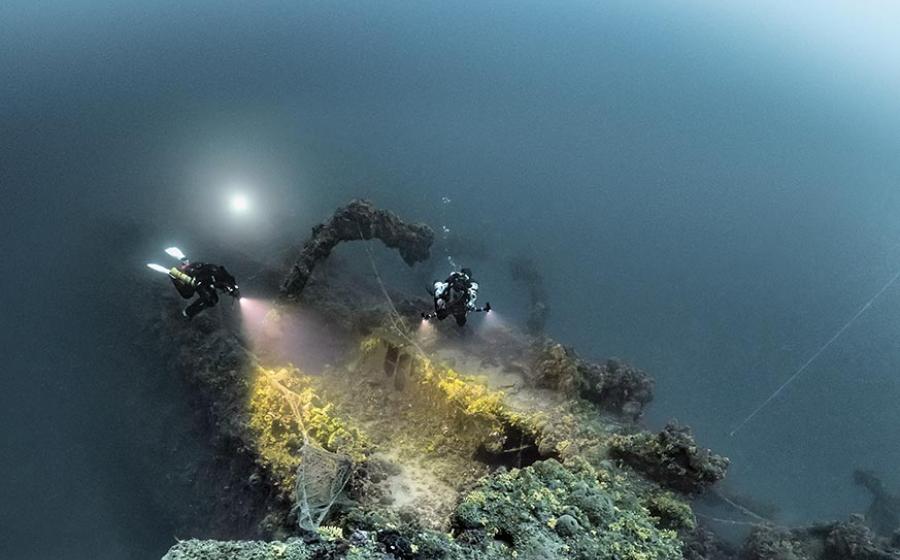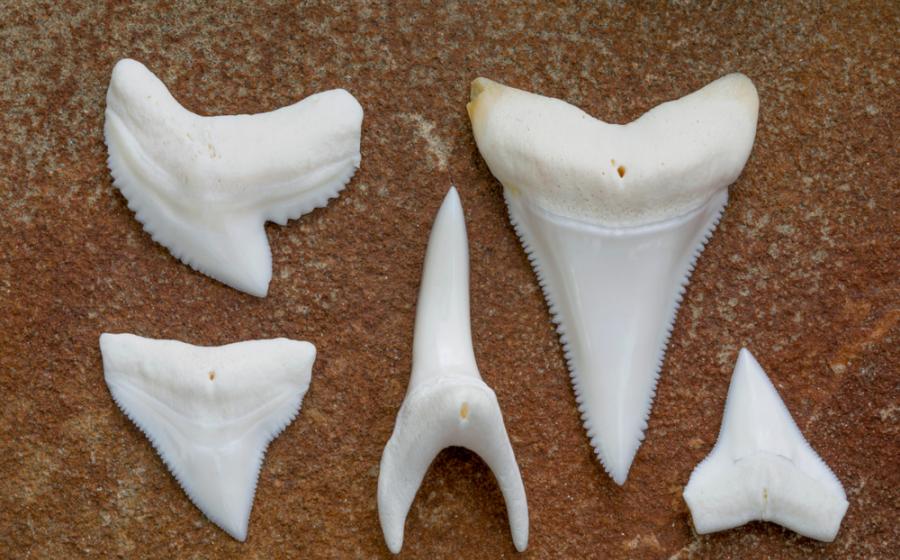Ask DAN: Managing Dive Accidents & Injuries

Scuba Diving Health | Managing Accidents
The DAN 24-Hour Diving Emergency Hotline receives more than 3,000 calls a year from divers who need immediate help managing an accident in progress. Sometimes that assistance is nothing more than a reassuring voice on the other end of the line, but other times it is a response to a life-or-death emergency, one in which every minute and every step counts. Regardless of the severity of the situation, one common question emerges among callers: What do I do now? Managing a dive accident scene or diver injury can be tricky and overwhelming, but most dive accidents and injuries share common protocols, no matter how simple or severe the case may be. Here's how to prepare and respond each and every time:
1) Come Prepared
Above all else, first-aid education should be paramount among all divers. At a minimum, take a basic first-aid/CPR class and renew your certification every two years as required. Additionally, a working knowledge of basic oxygen administration can be acquired through DAN's oxygen provider course (diversalertnetwork.org/training/courses/so2). Make sure you know where emergency responders are located in relation to the dive site, how quickly you can expect them to respond, and how they will access the site. Do this by creating an emergency assistance plan (EAP) ahead of time that includes all the information you'll need in a quick and accessible place. Even the most basic plans contain emergency contact information specific to the area, the locations of local medical facilities and helpful hints such as basic first aid reminders. Visit scubadiving.com/article/emergency_plan to download a sample emergency assistance plan--from the book Scuba Diving Safety, by DAN's president, Dan Orr, and DAN's training director, Eric Douglas.
2) Stay Calm
This may seem like a no-brainer, but adrenaline has a way of taking over in the heat of the moment. Before jumping to the rescue, stop, take a few deep breaths and count to 10 to calm yourself. This will greatly increase the effectiveness of your response.
3) Assess the Situation
Many well-intentioned rescuers put themselves at risk in their attempts to lend a hand. This can lead to another injured diver and hinder the rescue's effectiveness by creating two situations to manage and two divers in trouble. Before you jump in, identify any potential hazards to you or others and respond in the manner that puts you in the least amount of danger. For example, if there's a panicked diver on the surface, find a life ring or boat hook that you can throw or hold out to them rather than jumping in the water yourself.
4) Assess Responsiveness
"Diver, diver! Are you OK?" It's a statement we all learn and practice during our dive training because establishing a diver's responsiveness can help determine the urgency of a situation. Talk to the diver. Shout if you must. Shake the diver's shoulder and tap on his or her collarbone. If the diver is responsive, he or she will be able to give you vital information about what's wrong.
5) Call It In
Which emergency medical professional you call--the Coast Guard, DAN or someone else--will depend on your location (see "Who to Call," p. 85). But get the experts involved and on the way, right away. If the injured diver needs advanced life support or additional medical care, it's the experts who will provide it. If you have other divers on site, ask them to make the call while you care for the injured diver. If you're alone, place the call, describe the situation and explain that you're flying solo before you start first aid.
6) Basic Life Support
After contacting emergency personnel, make sure the diver is breathing. If the diver is unconscious or nonresponsive, put your ear near the diver's mouth to listen for breathing and simultaneously watch for the rise and fall of his or her chest. If the diver isn't breathing, establish and maintain a clear airway, and begin CPR.
7) Identify the Injury
Once basic life support is confirmed or maintained, look for and treat secondary injuries. If the diver remains unconscious, check him or her for bleeding or other obvious signs of distress. If you can't find any obvious injuries, continue to monitor and maintain basic life support until professional help arrives. Remember that just because someone has been diving does not automatically make the current problem a dive injury. Sometimes the best aid you can give is to administer oxygen and keep the diver calm. If the diver is conscious and able to communicate, ask these questions and write down the answers to help you and emergency responders figure out what's wrong: What symptoms are you experiencing? What were you doing before these symptoms started? Was marine life involved? Are you in pain? Are you having difficulty breathing?
8) Follow the Leader
When EMS arrives, listen to what they have to say and follow their instructions. No matter how trained or experienced you are, it's unlikely you have more experience than they do, so take advantage of what they know, provide them with whatever information you gathered, and then step back and let them take control.
9) Write It Down
If you have to manage a dive accident or injury, it's not an experience you're likely to forget. But details can get fuzzy, so as soon as possible, write down an account of what happened. If other divers assisted you on the scene, ask them to gather any other information they can. This should include the diver's profiles, if possible, and interviews with the diver's buddy or other divers who were in the water to see if they have any information that might help. Every detail counts, even if it's not dive-related. The victim's age, medical conditions and emergency contact information are all valuable pieces of information.
10) Diver Recall
If you are part of a dive group, the urgency of an injured-diver situation may require that you recall any divers still in the water. Some dive boats have sophisticated underwater recall systems with underwater speakers and alarms, but more commonly, the recall signal is something like banging a lead weight against the dive ladder. Regardless of the system, have a plan in place, and make sure every diver in the water is familiar with it.
Who To Call
Most divers know to call 911, and most know to call DAN. But sometimes there's confusion about who to call when.
-
If the injured diver is seriously injured or his or her life is in danger, call 911. Never put a diver's safety or life at risk by wasting time. If you're in a location that doesn't have 911 services, contact an operator who can connect you with the appropriate local service.
-
Once EMS is activated and first aid is under control, call DAN. DAN can coordinate with the emergency responders to help provide additional assistance and ensure divers get the treatment they need.
Call DAN first when:
-
No other emergency services are available, and you need management information.
-
The injury is not life-threatening but may require medical treatment, and you're not comfortable making that decision on your own.
-
It's not an emergency, but you have questions about a medical issue.
Remember, the more remote the dive location, the longer it will take for emergency personnel to reach you. Ensure you have either multiple oxygen units with you or a single unit designed for extended use. Stock up on first-aid supplies, including medications, bandages, blankets and water. And remember to have a method in place for staying in touch with the emergency crew. If you don't have a reliable radio or other means of communication, consider taking a satellite phone with you.
--
Scuba Diver photo from Shutterstock.com

The DAN 24-Hour Diving Emergency Hotline receives more than 3,000 calls a year from divers who need immediate help managing an accident in progress. Sometimes that assistance is nothing more than a reassuring voice on the other end of the line, but other times it is a response to a life-or-death emergency, one in which every minute and every step counts. Regardless of the severity of the situation, one common question emerges among callers: What do I do now? Managing a dive accident scene or diver injury can be tricky and overwhelming, but most dive accidents and injuries share common protocols, no matter how simple or severe the case may be. Here's how to prepare and respond each and every time:
1) Come Prepared
Above all else, first-aid education should be paramount among all divers. At a minimum, take a basic first-aid/CPR class and renew your certification every two years as required. Additionally, a working knowledge of basic oxygen administration can be acquired through DAN's oxygen provider course (diversalertnetwork.org/training/courses/so2). Make sure you know where emergency responders are located in relation to the dive site, how quickly you can expect them to respond, and how they will access the site. Do this by creating an emergency assistance plan (EAP) ahead of time that includes all the information you'll need in a quick and accessible place. Even the most basic plans contain emergency contact information specific to the area, the locations of local medical facilities and helpful hints such as basic first aid reminders. Visit scubadiving.com/article/emergency_plan to download a sample emergency assistance plan--from the book Scuba Diving Safety, by DAN's president, Dan Orr, and DAN's training director, Eric Douglas.
2) Stay Calm
This may seem like a no-brainer, but adrenaline has a way of taking over in the heat of the moment. Before jumping to the rescue, stop, take a few deep breaths and count to 10 to calm yourself. This will greatly increase the effectiveness of your response.
3) Assess the Situation
Many well-intentioned rescuers put themselves at risk in their attempts to lend a hand. This can lead to another injured diver and hinder the rescue's effectiveness by creating two situations to manage and two divers in trouble. Before you jump in, identify any potential hazards to you or others and respond in the manner that puts you in the least amount of danger. For example, if there's a panicked diver on the surface, find a life ring or boat hook that you can throw or hold out to them rather than jumping in the water yourself.
4) Assess Responsiveness
"Diver, diver! Are you OK?" It's a statement we all learn and practice during our dive training because establishing a diver's responsiveness can help determine the urgency of a situation. Talk to the diver. Shout if you must. Shake the diver's shoulder and tap on his or her collarbone. If the diver is responsive, he or she will be able to give you vital information about what's wrong.
5) Call It In
Which emergency medical professional you call--the Coast Guard, DAN or someone else--will depend on your location (see "Who to Call," p. 85). But get the experts involved and on the way, right away. If the injured diver needs advanced life support or additional medical care, it's the experts who will provide it. If you have other divers on site, ask them to make the call while you care for the injured diver. If you're alone, place the call, describe the situation and explain that you're flying solo before you start first aid.
6) Basic Life Support
After contacting emergency personnel, make sure the diver is breathing. If the diver is unconscious or nonresponsive, put your ear near the diver's mouth to listen for breathing and simultaneously watch for the rise and fall of his or her chest. If the diver isn't breathing, establish and maintain a clear airway, and begin CPR.
7) Identify the Injury
Once basic life support is confirmed or maintained, look for and treat secondary injuries. If the diver remains unconscious, check him or her for bleeding or other obvious signs of distress. If you can't find any obvious injuries, continue to monitor and maintain basic life support until professional help arrives. Remember that just because someone has been diving does not automatically make the current problem a dive injury. Sometimes the best aid you can give is to administer oxygen and keep the diver calm. If the diver is conscious and able to communicate, ask these questions and write down the answers to help you and emergency responders figure out what's wrong: What symptoms are you experiencing? What were you doing before these symptoms started? Was marine life involved? Are you in pain? Are you having difficulty breathing?
8) Follow the Leader
When EMS arrives, listen to what they have to say and follow their instructions. No matter how trained or experienced you are, it's unlikely you have more experience than they do, so take advantage of what they know, provide them with whatever information you gathered, and then step back and let them take control.
9) Write It Down
If you have to manage a dive accident or injury, it's not an experience you're likely to forget. But details can get fuzzy, so as soon as possible, write down an account of what happened. If other divers assisted you on the scene, ask them to gather any other information they can. This should include the diver's profiles, if possible, and interviews with the diver's buddy or other divers who were in the water to see if they have any information that might help. Every detail counts, even if it's not dive-related. The victim's age, medical conditions and emergency contact information are all valuable pieces of information.
10) Diver Recall
If you are part of a dive group, the urgency of an injured-diver situation may require that you recall any divers still in the water. Some dive boats have sophisticated underwater recall systems with underwater speakers and alarms, but more commonly, the recall signal is something like banging a lead weight against the dive ladder. Regardless of the system, have a plan in place, and make sure every diver in the water is familiar with it.
Who To Call
Most divers know to call 911, and most know to call DAN. But sometimes there's confusion about who to call when.
If the injured diver is seriously injured or his or her life is in danger, call 911. Never put a diver's safety or life at risk by wasting time. If you're in a location that doesn't have 911 services, contact an operator who can connect you with the appropriate local service.
Once EMS is activated and first aid is under control, call DAN. DAN can coordinate with the emergency responders to help provide additional assistance and ensure divers get the treatment they need.
Call DAN first when:
No other emergency services are available, and you need management information.
The injury is not life-threatening but may require medical treatment, and you're not comfortable making that decision on your own.
It's not an emergency, but you have questions about a medical issue.
Remember, the more remote the dive location, the longer it will take for emergency personnel to reach you. Ensure you have either multiple oxygen units with you or a single unit designed for extended use. Stock up on first-aid supplies, including medications, bandages, blankets and water. And remember to have a method in place for staying in touch with the emergency crew. If you don't have a reliable radio or other means of communication, consider taking a satellite phone with you.
--
Scuba Diver photo from Shutterstock.com










